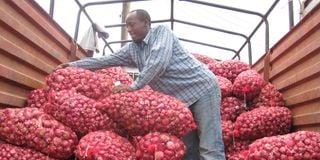Happening Now: Gachagua in court for hearing of impeachment case
Onion prices rise due to reduced imports from Tanzania

A trader unloads onions to sell. An onion shortage in the country has been exacerbated by a decline in production by farmers.
Kenyans are grappling with the high cost of onions as traders are hit by a shortage of the commodity, which is now trading at Sh150 per kilo due to reduced imports from Tanzania.
The shortage has also been exacerbated by a decline in production by farmers, who cite high costs of production and drought in the country in recent years.
Compared to recent months, onion prices have shot up by as much as 87.5 per cent from Sh80 per kilogram in March, depending on the variety of onion.
A spot check at Nyeri Town markets shows that few traders are stocking their piles of produce with onions, citing the high cost of the commodity.
According to Mr Benjamin Kamanja, the chairman of traders at Chaka market, they have always relied on Tanzanian onion because of its quality, price and stable supply.
Also Read: How and when to harvest bulb onions
Consumers also prefer onion bulbs from the neighbouring country because they are well-dried and therefore have a longer shelf life compared to locally grown onions.
Mr Kamanja also said that the main growers and suppliers of onions in the Ngage and Mang'ora areas of Tanzania had only grown onions on small parts of their farms, contributing to the shortage.
Farmers in Tanzania are now selling the onions to Kenyan traders for between Sh115 and Sh120 per kilogram, up from between Sh30 and Sh40 for the same quantity a few months ago, which is five times the previous price.
"There is very little onion coming from Tanzania and we are heavily dependent on their supply. This means that prices will continue to rise because of the shortage," said the chairman.
Locally, a lot of agricultural productivity is rain-fed, including onion farming, which in Nyeri takes place in Kieni Constituency, where the majority of farmers are smallholders.
"Onion farmers especially here in Kieni are smallholder farmers who depend on rain-fed agriculture and last season there was no onion and currently they have dried up because the rains have stopped. This has added to the shortage," he said.
In addition, the majority of farmers in Kenya produce their onions between January and March and August and October, depending on the region. This means that there is a shortage of onions from May to mid-August.
"Very few farmers use irrigation, which means that there cannot be a steady supply of onions all the time. We need the imports," adds Mr Kamanja.
On the other hand, farmers bemoan the high cost of inputs, which they say has contributed to the reduced supply on the market, as well as the lack of irrigation water.
For 500 grams of onion seedlings, farmers have to part with Sh20,000.
"Most of us cannot afford to buy quality seedlings because the cost of production does not even match the farm gate price offered to us by brokers," said Mr Solomon Wanjohi, a farmer from Kinyaiti in Kieni Constituency.
Farmers want the government to invest in irrigation projects to support a steady supply of locally grown onions, which will also limit imports of onions from Tanzania.
"All we want is water to grow onions and farm gate prices capped at Sh50 per kilogram," said Mr Moses Kihara, a farmer from Mairo in Kieni Constituency.





